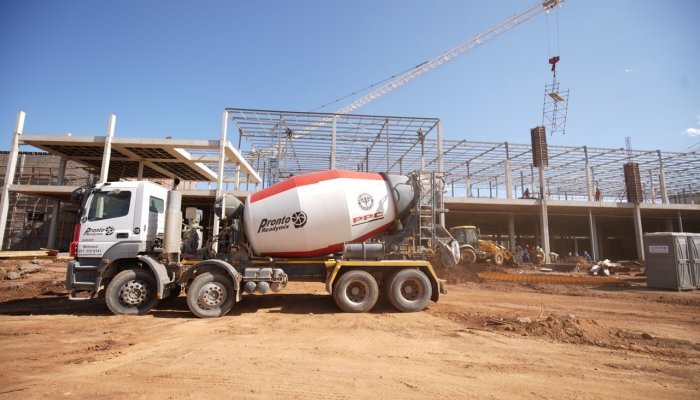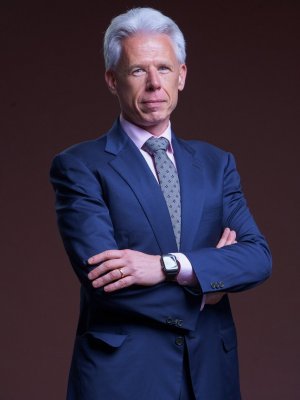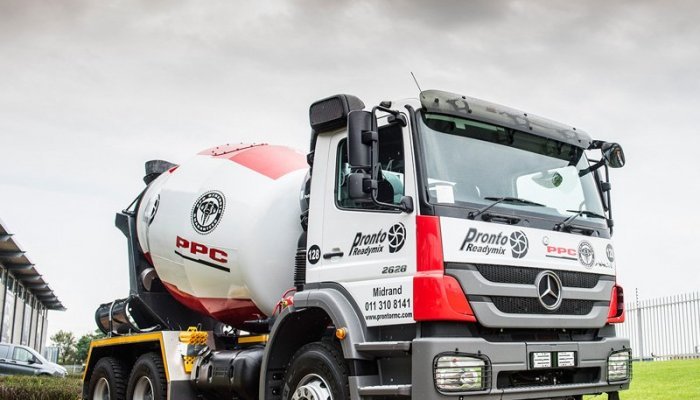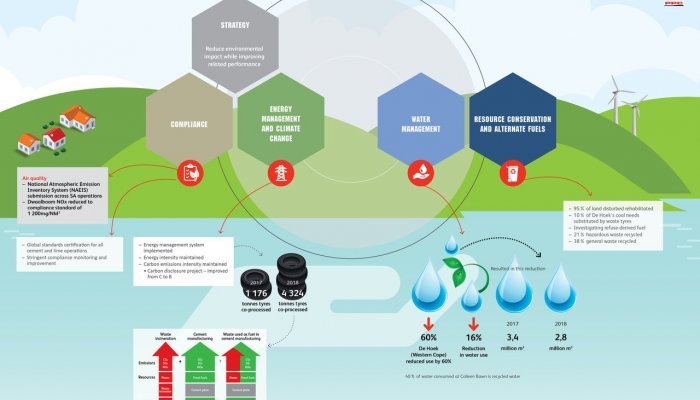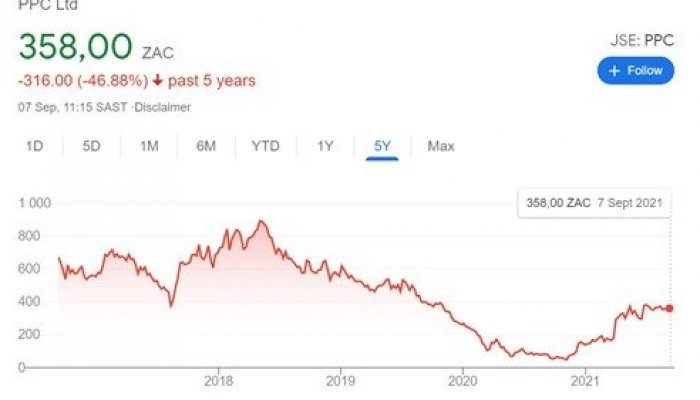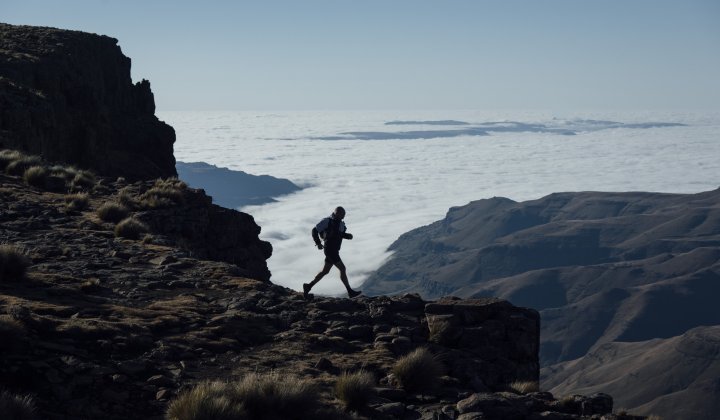As 2019 neared an end, the world was teetering, the South African economy was creaking, and the business he now led was floundering. On top of that, the industry he knows as well as anyone alive sat under the tightening screws of environmental pressures.
The new CEO of PPC was in a fight for survival. It was the sort of emergency that tests not just the ability to perform but to stick to your values. It’s easy to be angelic when the going is good. But how would the new boss of the JSE-listed cement maker keep the company alive, turn it around and do so in a way that meant he and all the stakeholders could sleep soundly at night?
That is not to suggest Van Wijnen faced a necessary conflict between doing well and doing what is right. In fact, findings are that ethical companies financially outperform the rest. Studies are emerging showing that equities that meet gauges of good behaviour tend to beat the average for the index they are in. They win on return on invested capital, pay workers more and are hit with fewer fines.
Van Wijnen was an industry veteran of many years when PPC head-hunted him. The Dutch national had run large operations for Holcim from Bratislava in eastern Europe to Manila in the Philippines and more. But nothing could have fully prepared him for what he faced in Africa.
“So, how’s the new job?”
To start, and well known to South African business followers, PPC was in a financial crisis. From a share price of nearly R22 late in 2014, the blue-chip had plummeted to the point you could pick a share up for 50c and have change. The chatter was that the JSE firm would go to the markets for a capital injection in the first quarter of 2020. A venture in the Democratic Republic of the Congo (DRC), in particular, was making what seemed to be untameable losses. Its home market of South Africa was in a zero-growth GDP slump.
Globally, news was emerging of a novel virus taking lives in China. In the months to follow, much of the globe would be thrust into lockdowns. South Africa’s heavy weeks of Level 5 stay-at-home orders kicked in some six months into van Wijnen’s tenure. Many operations ground to a halt, and staff adjusted to working from home wherever possible.
Local cement makers were under the pressure of cheap imports where, in the quasi-commodity space, the price has outsized importance.
At an industry level, PPC plays in a space that green lobbyists relish in demonising. Making cement is not a clean process, but we all need it. It is a difficult calculus to manage.
Start somewhere
Van Wijnen is an engineer. In his words, “a simple engineer”. And he likes to simplify complex things. To systematise. To generate and apply rules. To do things right. At the onset of the pandemic, the team set a basic hierarchy of objectives in motion: “First, keep people safe; second, keep the economy going; and third, keep PPC moving forward,” he explains via video link from his office in Johannesburg. “Our people, customers, suppliers and others make up the company. And if there’s no economy, there is no company.”
He appears to take a page from the book of Sun Tsu, who famously said, “He will win whose army is animated by the same spirit throughout all its ranks”. So, after his deep breath, he set about communicating and getting everyone animated by the same spirit. “Good businesses share the same good values,” he explains. “We had a big town hall a week before lockdown started. We wanted to ensure everyone had access to quality information, given the amount of poor information that was circulating. A staff support line gave people a direct line to assistance.”
A similarly cool-headed approach was applied to salaries and jobs. “We had agreed on certain salary increases,” he says. “But that was simply no longer viable. So we went to staff with a request. We asked for their blessing to cancel agreed raises.” The fact that a court battle was avoided suggests it was received with understanding (albeit, one imagines, grudgingly). “But we didn’t cut any pay throughout the lockdown,” he adds. “We also postponed the redundancies we needed to make as part of a restructuring already planned prior to the lockdown.”
Later, the company did have to make lay-offs. “That is always hard,” says van Wijnen. “But it is easier if you have a guiding ethos.” Remember: people, economy, company.
Here the jet-grey-haired van Wijnen volunteers surprising but refreshing frankness. “You might ask if I should have sacrificed some of my salary at a time like this,” he remarks. This is often argued but rarely addressed square-on by executives. And rarely despatched with such candour. “I have a value to the company. That is something the market determines. It is competitive. I don’t want to earn less than I am contracted for.” Who among us would?
“Many companies were sending force majeure letters,” he recalls of the weeks at the start of the coronavirus crisis. “We were determined not to follow suit. But, we realised that many of our suppliers and customers had worse balance sheets than ours. And we were in better shape than some. So, we spoke to them. We helped where we could. Where our suppliers were able to lend us a hand, they invariably did.”
Move forward
With just a hint of breathing room, van Wijnen and his team could turn to the industry-wide threat of cheap imports. We all know the economic basis for free-flowing international trade. The low-cost producer makes the widget, and all ships rise on the tide of efficiency. Van Wijnen pre-empts the question: “Are we just being lazy? Asking the government to save us?” And he answers it: “No. We can demonstrate that suppliers from places like China, Vietnam and Pakistan are not competing on a level playing field. They don’t meet the standards that we do, and they are offloading excess capacity for as little as their variable costs. So, we are sticking to our values and defending jobs in South Africa.”
Team PPC joined Cement and Concrete SA (CCSA), the industry association, in making a case to regulators to designate cement for a minimum threshold for local production and content. National Treasury answered in the affirmative. As of 4 November 2021, state construction tenders are to be open only to local cement.
The spreading realisation that humankind needs to protect the environment is a weight pressing the air out of many “dirty” industries. Cement makers dig stone out of the ground by the ton, heat kilns with fossil fuels and transport the finished product on diesel trucks. All in, the industry accounts for as much as 8% of the world’s carbon dioxide emissions.
Environmental pressure on specific industries is misdirected. This is an ecosystem that we all participate in. As the GIBS Centre for African Management and Markets (CAMM) slogan captures it, ‘Build. Connect. Do’. Our motivating frameworks, including the Six-factor Model, demonstrate the prosperity we can generate with developments that need a cement foundation. Connectivity means roads. Education means the internet. But this, like everything in life, is about balance.
Van Wijnen lays out his approach with a story from a time working on a project in Europe. “A new regulation came down demanding we clean up one of our processes by at least a given amount. We did the calculations and found that we could meet that standard and then some. The decision was made to just hit the legal target and no more. I remember being frustrated. Why not do more? Of course, it would have cost more money. So going that extra mile could have been the wrong decision, unnecessarily making us less competitive.”
Again, van Wijnen has an uncomplicated rule for a complex problem. “We must meet all legal requirements. Then we can ask how much we want to press ahead of them. It’s something the industry needs to do together. We should push the right amount ahead of the game. But if it makes you meaningfully less competitive, you are actually threatening employment for people, the competitiveness of our economy and ultimately the viability of your company.” Clear, robust and forward-looking.
The Covid conundrum
The spike protein in the room is a whole new sort of moral puzzle. Can we and should we mandate Covid-19 vaccinations? This one seems to weigh heavily on Van Wijnen. “For me, the vaccine is a good idea. I have had it. At one level, I see a case to mandate it throughout the company. But at the same time, I respect people’s liberty and choice to make decisions about their health. And I worry it is a slippery slope to make things like this obligatory.”
This is a live moral dilemma for Van Wijnen. He appears to be applying another of his principles. “At times, we need to acknowledge that we just don’t know the answer yet. Unfortunately, not everything falls into my engineering world of 1 + 1 = 2. So, we seek the best information, communicate well, learn and set common objectives.”
Upward and onward
PPC’s share price was up to R5.50 when we went to print in late October 2021. You could validly call that either a modest claw-back or an impressive 10-fold increase in under a year. Cut-price imports have been limited. Steady progress convinced the banks not to pressure the company to raise new capital earlier this year. And a debt restructuring agreement in the problem-child DRC operation recently brought a sigh of relief to investors.
Van Wijnen may be huffing and puffing after his first year in Africa. Only he knows how soundly he sleeps at night. That PPC has survived, resolved several long-standing and existential impasses, and even boosted its share price suggests he earned it – for himself, and “people, economy, company”.
Disclaimer: PPC and CAMM have joined forces on a multi-year project. We will address the challenge of achieving prosperity in Africa and collaborate on ensuring PPC is a meaningful part of that future. Key outputs to look forward to include a ‘Building Africa’ report, academic case studies, thought leadership, and various interactive events. Team CAMM looks forward to fruitful synergy.


